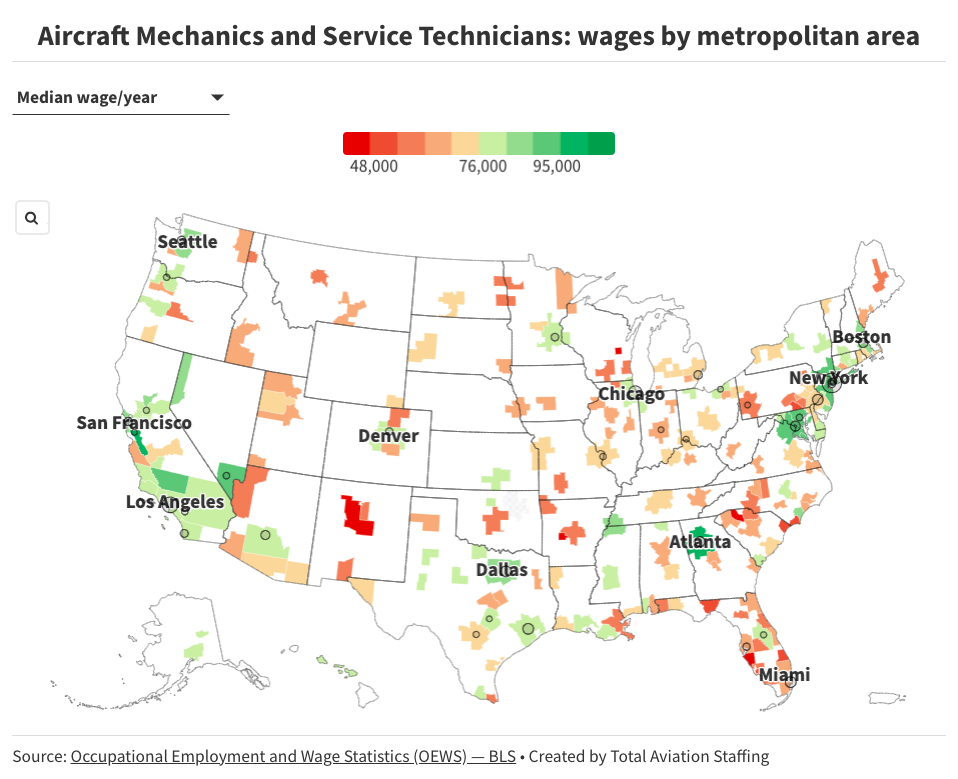Here’s where aircraft mechanics and avionics technicians earn the most — and least!
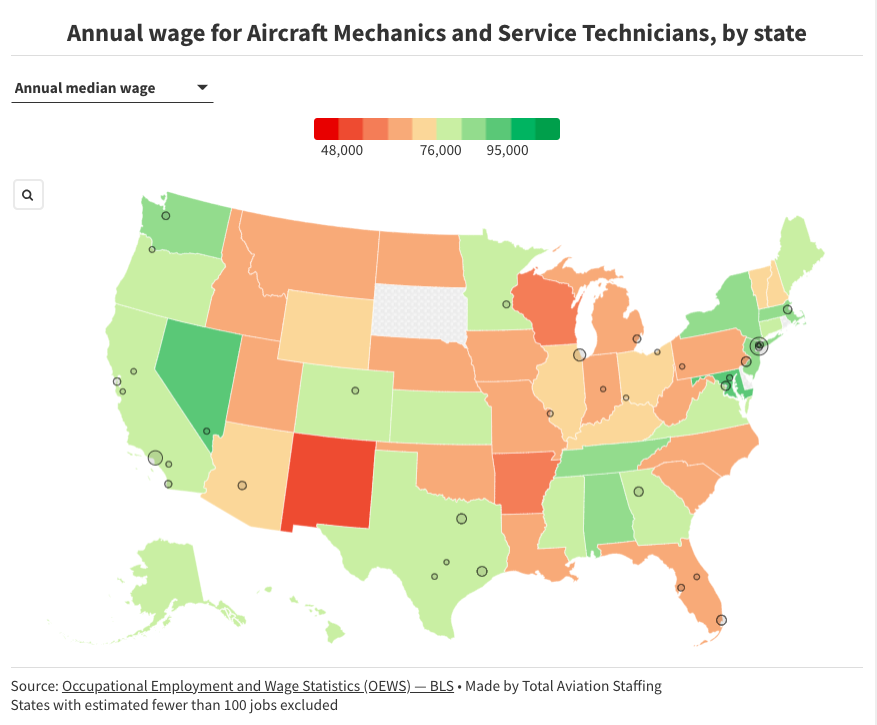
Fair warning: working as an aircraft mechanic or avionics technician isn’t for the faint of heart! The work is super interesting. It’s rewarding to know that you’re literally keeping people safe. But nobody will tell you it’s easy!
If you’ve already started off in this career, you know the deal. You need to be strong. You often work in noisy places. You need to have a wits on you and always pay scrupulous attention to detail. Not to mention all the technical knowledge of aircraft systems and components you need to have at the ready.
But there’s no denying one of the main upsides: it sure pays well!
Check out our Aircraft Mechanics and Avionics job listings right here, for example. We have some great opportunities!
In this post, we'll tell you exactly where to get the highest salaries — and where the wages are more modest. Because there are some serious differences, from state to state and between industries. Some places should be on your professional bucket list. Others, though? They might be great for starting off your career, but you probably won’t want to end up there later on.
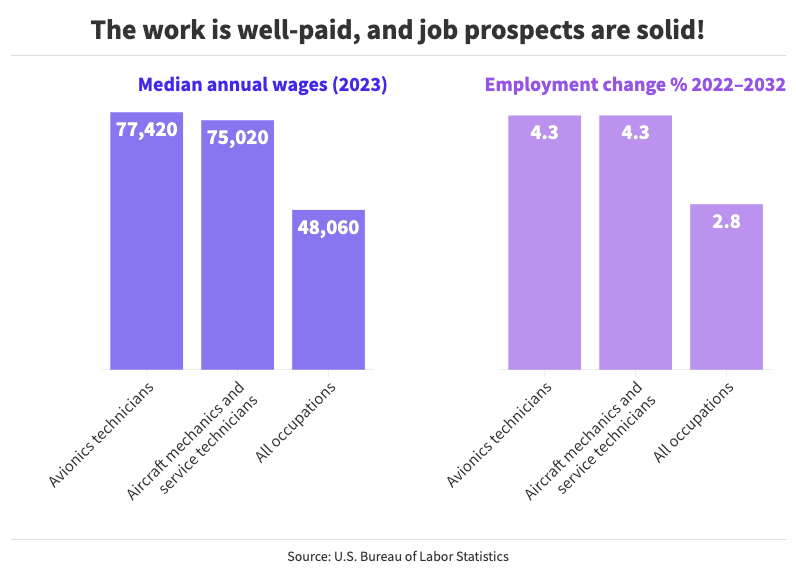 Here’s how much your colleagues get. How does your salary compare?
Here’s how much your colleagues get. How does your salary compare?
The median wage for aircraft mechanics and service technicians is $75,020 a year, according to the last available data (May 2023). Avionics technicians on average get about two thousand bucks a year more still: $77,420.
Now compare that with the median wage for the American workforce as a whole, which is just $48,060. This is over one and a half times as much. It’s worth a little elbow grease!
How median wages work is that half the people in the profession earn less than that — and half of them earn more. It depends a lot on where you work and what exactly you work on. The size of aircraft you repair, and the complexity of your job. How much experience you have. Whether you have a union job or not.
The highest-paid aircraft mechanics work at large airports and airlines, where they can earn well over $100,000 per year. But if you work in smaller airports, that salary might be a lot less. A lot of this involves common sense: jobs involving small private planes don’t pay the same as those keeping large commercial jets in the sky.
But here's the bottom line. Over the course of your career, you’re almost guaranteed to earn more than the average American . In these occupations, only the least fortunate 10% or so get a lower salary than the typical US employee — and that’s often just for entry-level jobs.
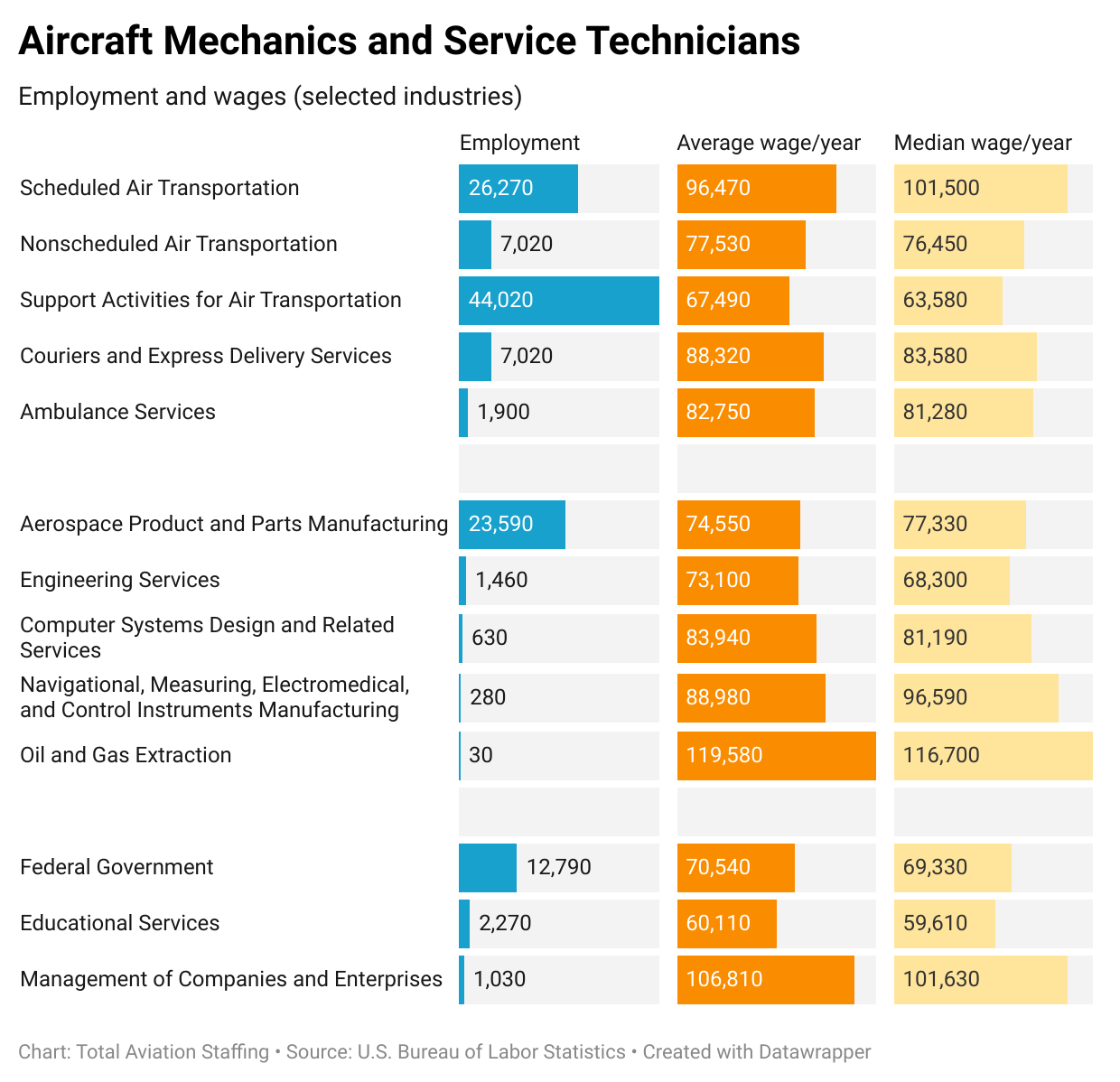 Airfare discounts, free lodging, housing allowance? The benefits are giving
Airfare discounts, free lodging, housing allowance? The benefits are giving
There are additional benefits to take into account as well. Medical insurance, 401k retirement plans and paid vacation days are the obvious ones, and they can make a major difference. In some places, jobs might come with a cost of living adjustment or relocation expenses. Other jobs will offer performance-based rewards.
But in this profession you also get some perks that few others provide! Many airlines offer their employees discounts on airfare, which can save you hundreds or even thousands of dollars each year. You might get free or reduced-price lodging at airport hotels too.
Perks and benefits are more reliably available in commercial aviation than in private aviation, especially at the larger airlines. Take Southwest Airlines. They offer their Lead Avionics Technicians a generous profit-sharing package, stock purchase plans, and flexible work arrangements. Or Emirates: they provide a housing allowance and tax-free income. United Airlines throws in on-site fitness centers. Plan your career accordingly!
Working in a growing profession means they'll always need you
Concerned about job security as much as about salaries? Don't worry: the job outlook for both professions is pretty good too. There may come a day when people really start flying a lot less to stop climate change but… well, today is not that day. Over the next ten years or so, the employment of both aircraft mechanics and avionics technicians is projected to grow by 4.3%. That's an impressive one and a half times better than US employment overall (2.8%)!
For aircraft mechanics and service technicians, that means almost 11 thousand new job openings every year. Still a pretty niche profession, but one with healthy prospects. The job market for avionics technicians is more specialized, with around 2 thousand new positions a year. But it should keep growing at a solid pace for a long time. Aircraft controls, systems, and flight instruments are becoming ever more digital and computerized. Cybersecurity is turning into a major focus in aviation on a global scale. They're going to need you!
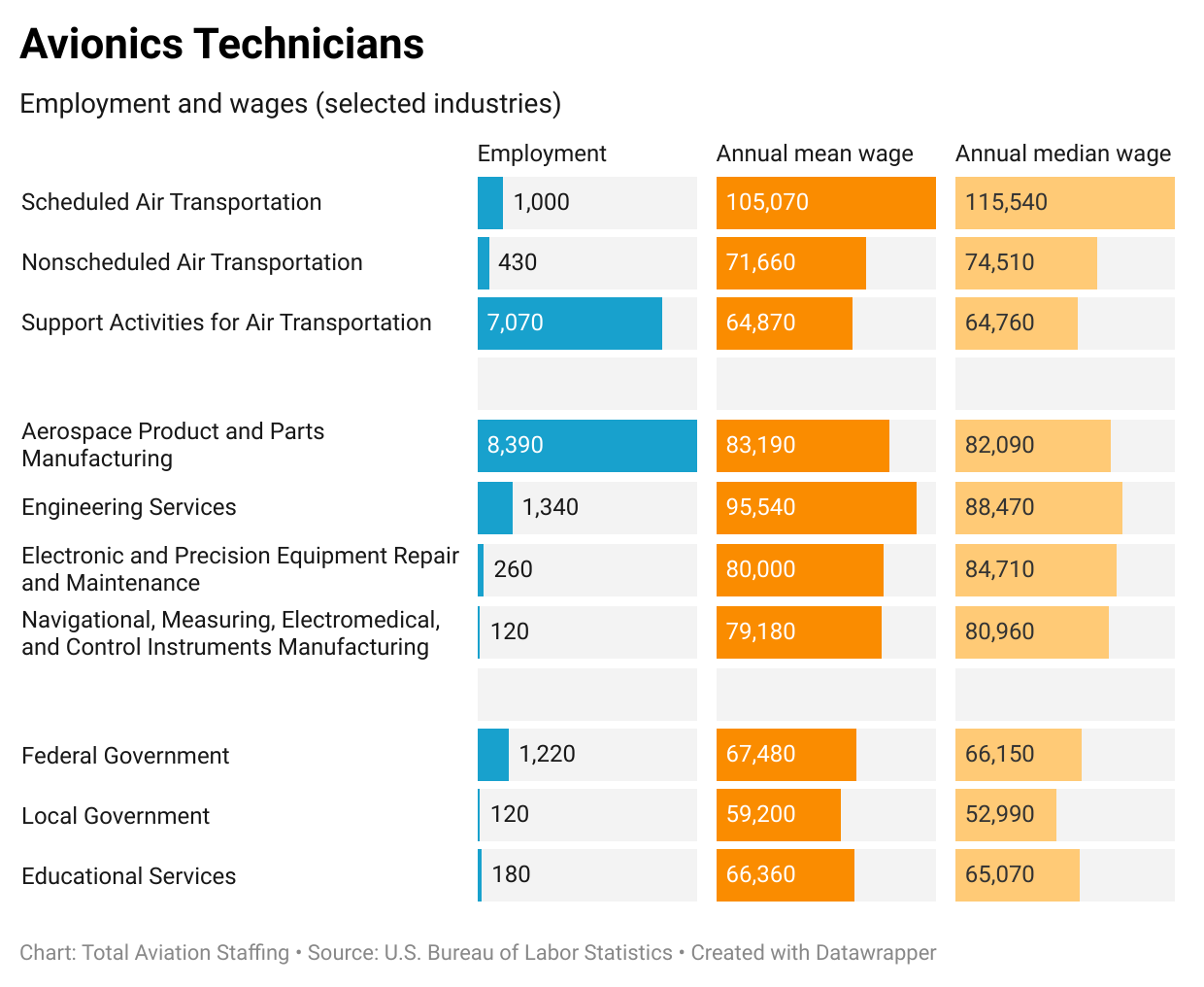
Picking your industry, and why it matters
How much you can expect to make exactly depends a whole lot on where you work. I mean that in two different ways — and they both count. Where in the country? And in which industry?
Working in the government sector, for example, will have its upsides. It's probably good for your job security. For your wallet, though, not so much.
Avionics technicians in the service of local government authorities are stuck at an average annual wage of less than $60,000. Aircraft mechanics and service technicians who work for the federal government get paid an average of $70,540 a year. That's already a decent sum — but still less than average.
Compare that to those who are employed by couriers and express delivery services, who get an average of $88,320 a year. Or the literal 30 aircraft mechanics and service technicians in the gas and oil industry, who get a whopping $120 thousand a year on average!
If you're looking for a great end destination for your career, look to the scheduled air transportation sector. That's where about one in five aircraft mechanics and service technicians work, so it's not an unrealistic goal. And the average wage is over $96 thousand a year.
There's less work for avionics technicians in that sector, but it pays exceptionally well ($105 thousand on average). Working in aerospace products and parts manufacturing ($83 thousand) is a great alternative. And as luck has it, that's where over a third of the avionics technician jobs are.
Want to take a closer look? Check out the charts above. They’ll show where the jobs are — and how much they pay!
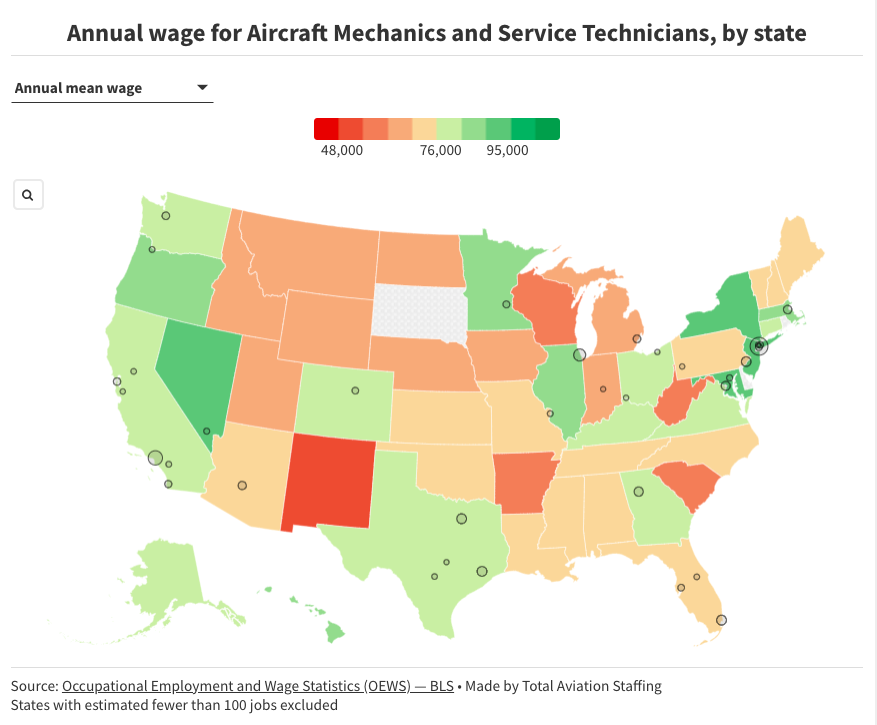
Some places on the map have a few really well-paid jobs. Others are better for the average employee
Dig into the wages by state and by city, and you'll get a bit of a whiplash as well! The median wage of Aircraft Mechanics and Service Technicians is twice as high in Nevada as in New Mexico. The average wage is almost twice as high in New York. Location matters!
We’re showing you both maps — median and average — and they look quite different. How can that be?
Let's put it this way. If the median wage ain’t all that impressive but the average wage is very high, that means there are outlier jobs. They probably have a bunch of very specialized, highly paid jobs for a relatively small number of professionals that pull the average way up. So unless you’ve got some bespoke qualifications, the median map is going to be more real for you!
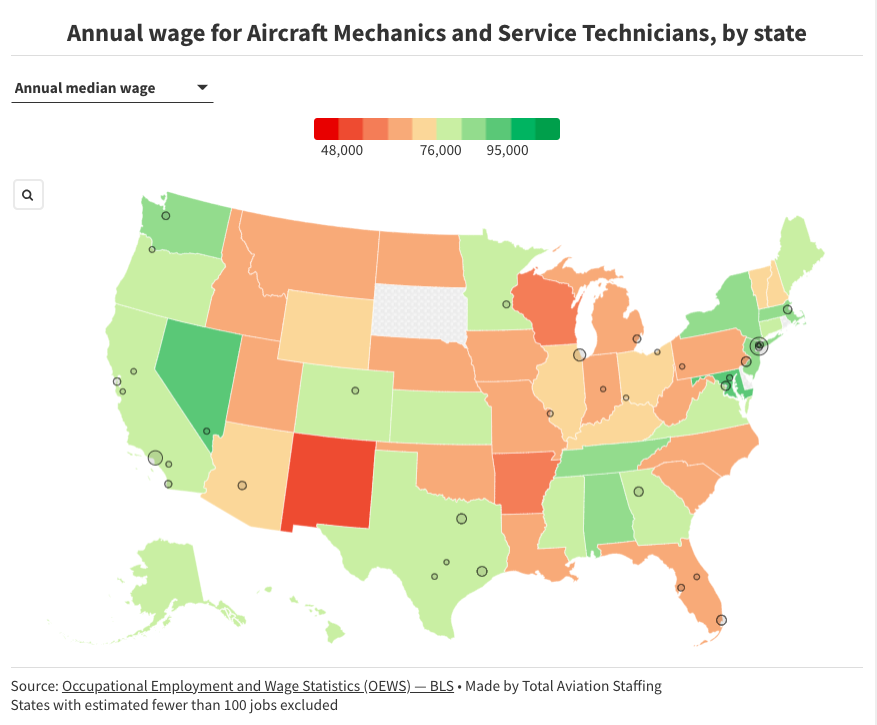
The first thing that will catch your eye on both maps is that there's a pretty clear urban-rural gap. The money’s better in many of the larger cities, where most of the jobs are. Salaries are especially competitive around high-demand aviation hubs.
It's a very different story in a rural band of states across the country from Idaho to Arkansas. Wages aren’t great for aircraft mechanics, and there aren’t really significant opportunities for avionics technicians at all. Goes for New England too, at least north of Boston.
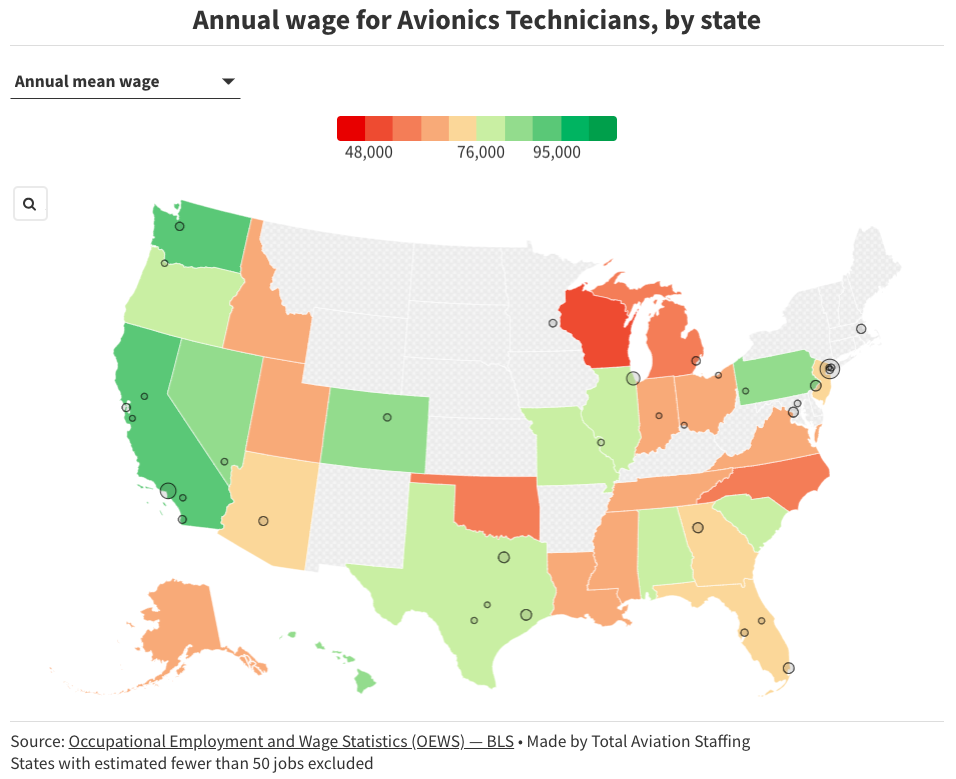
It’s a contradiction that comes with such specialized, future-friendly work. Employment is growing, but the best job opportunities are concentrated in a limited number of places.
It’s only fitting, really, if your job is to safely get airplanes in the air, that there’s a ton of advantages to being willing to travel. It's easy to find work at airports in other states — or even other countries. Aircraft mechanics are in high demand all over the world!
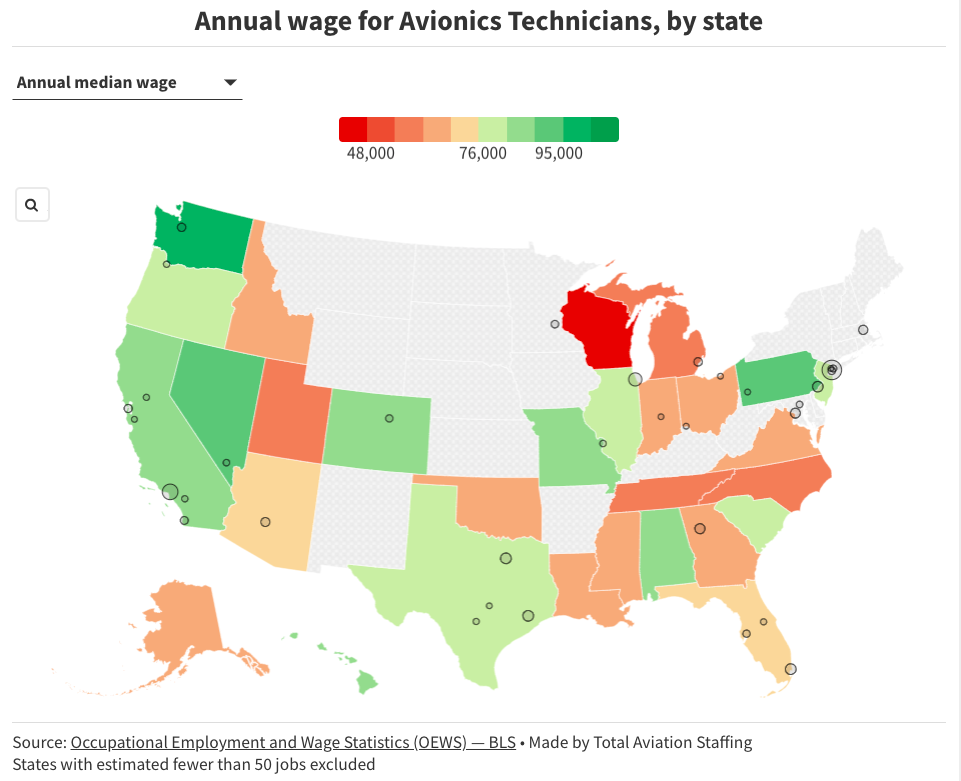
You’ll never stop learning — and your financial horizons will never stop expanding
The wide range of salaries also means that there’s plenty of room for advancement. Start with internships and job placement opportunities. Get an already decently paid job at the lower end of the range. Then work your way up to the kind of position where 100 thousand is a real possibility.
Above all, the key to boosting your earning potential is — to use that ugly cliché — life-long learning. You don’t have to go to college for years to enter the profession, but the flip side is that the training never really stops. It’s just that a lot of it is hands-on!
What matters right at the start — but for real? Certification! With that “A” rating from the FAA for bodywork and the “P” certificate for engine work, you become instantly more attractive to employers. Aircraft mechanics and service technicians with an FAA certification on average earn over a quarter more. No matter which industry you work in, it makes for a significant difference in your wages.
But that's just the start. Stay up-to-date with the latest technology, because in this field it’s always changing. Specialize in a particular type of aircraft or a specific area, like engines or electrical systems. Once you've proven yourself, some employers will offer tuition reimbursement for more specialized certifications. Getting that FAA Airframe or Powerplant certification can materially boost your earning potential.
Joining a professional association gets you access to member-only resources, from certification programs to networking opportunities. There’s a whole bunch that are worth looking into, with a jumble of acronyms: AMTA, NATA, PAMA, IAMTS, AEA.
Beyond that, going back to school to get a bachelor’s degree in engineering or aviation management are further options still. Hone your technical and managerial skills enough, and you'll end up overseeing the entire operation of an aviation maintenance facility. Supervising the work of whole teams of mechanics as a senior aviation mechanic. At that point, your yearly earnings might easily triple what you started out with. Quadruple, even!
In this line of work, your financial horizons can keep expanding forever — you’re never stuck!
